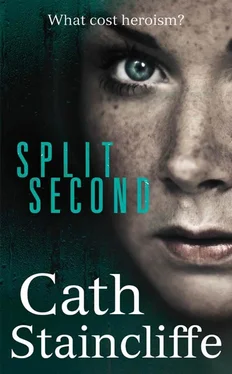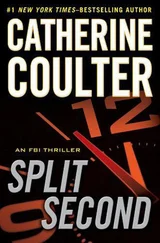‘Mum.’ Ruby in tears again.
Her own eyes stung in response, but she fought against it; she had to be strong, pull them all through this. ‘Hey.’ She moved round the bed. Held her daughter.
‘It’s not fair,’ Ruby blurted out. ‘It’s so awful.’
‘Shush, hush now.’
When Ruby had calmed down, she too said goodbye to Luke, and then they followed the winding corridors out.
The freezing air hurt Louise’s lungs, the same sensation she remembered after she’d had the kids each time, when she’d been awake for hours on end, using all the reserves her body had. She pulled her scarf over her nose and mouth. She switched her phone on and felt it buzz. A stack of messages: Ruby’s school, Carl, the agency. People to tell.
At home, Luke’s lights were still on in the sycamore tree, sparkling on the frost that limned the branches. Glittering on the snow.
Ruby had some cereal and went to lie down, while Louise sat and rang round. Her mind looping back again and again to Luke in the hospital bed, his poor ruined face, his broken teeth. Listening to people’s expressions of horror as she outlined what had happened.
When she went into the kitchen, she saw a dark shape against the back window. The tree that Carl had dropped off, bound in a nylon sheath and propped up, out of sight of the road and anyone with light fingers. She flung open the back door and went round to the garden. She grabbed the tree, the needles piercing her hands, and shoved it over, kicked at it, almost losing her footing on the slippery snow. Furious, repeating over and over as she swung her foot, ‘Stupid bloody tree, bloody stupid bloody tree.’ Until she was spent and sobbing in the keen night air.
She couldn’t sleep; her body was too far gone, her nerves tight as cheese wire. She sat unseeing at the table for long enough, then went round to her neighbours, desperate for a ciggie. She’d given up almost three years ago, but now the craving was extreme.
‘Oh, Louise, how is he?’ Angie was shaking her head. She was housebound, diabetic and extremely obese. Answering the door rendered her breathless. She lived in her sitting room, slept in a reclining chair. Her daughter Sian looked after her.
Louise gave her the low-down. ‘You got a spare ciggie?’
‘Course.’ Angie walked slowly back to her chair, picked the packet up from the side table and passed it to Louise. ‘Lighter’s inside.’
Grateful, Louise pulled out a fag, fired it up. Felt dizzy, her eyes doing funny patterns like a kaleidoscope. Took another drag.
Angie nodded at the coffee table. ‘The paper’s there, you seen it?’
Louise picked it up, sat on the settee. Student Stabbed to Death. She studied the photograph. She felt dull, her wits blunted by the trauma. She wondered if the boy was a friend of Luke’s, but she couldn’t recall him knowing any Jasons, and she didn’t recognize the lad in the paper. The attack had been outside this Jason’s house. They hadn’t given Luke’s name.
‘The police didn’t tell us much,’ she said. ‘I don’t know what he was doing there.’
Angie tutted at the paper. ‘They all carry knives these days,’ she said, wheezing as she spoke. ‘Terrible.’
Did Luke? Louise didn’t think so, but she couldn’t be completely sure. He wouldn’t be that daft, would he? ‘Can I take another?’ She held up the packet.
‘Take a twenty.’ Angie nodded to the corner cupboard. ‘In there. I’ve plenty more. Sian got ’em duty free.’
‘You’re sure?’
‘Go on, before I change my mind.’
Louise nodded. Took a packet. ‘I’ll pay you back.’
‘You will not,’ Angie scolded. ‘Don’t you bloody dare.’
Louise wanted her grandad. Times like these it was him she missed, more than her mother or father or grandma. He’d been proud as a peacock when Luke was born, insisted on taking him in his pram to the CND meeting at the Labour club, promising to be only an hour. By then her mum had died. Just keeled over one day in Asda. When they did the post-mortem, they found she had a hole in her heart. It had been there all along and no one had ever known.
They had a party for Louise’s mum after the funeral, and her friends from the ships came, those that were in between trips. They sang all her repertoire. One man brought along a cardboard cut-out of her mother in a wine-coloured evening gown and long gloves, her hair in a Doris Day, pearls round her neck, something that had been used to advertise a forties night on board. Teenager Louise hated them, all these people who knew her mother well, who’d had the best of her. Coming up and insisting on talking about the larks they’d had and how Louise’s mum had been a good friend in times of trouble.
‘Why did they have to come?’ she complained to Grandad.
‘They mean well.’ He’d looked at her a while, his eyes soft. ‘She had itchy feet, always had. Hard on you.’
She felt a flash of hatred for him then too. Why did he always have to be so bloody understanding? ‘I’m fine!’ she retorted. She downed her drink too quickly, making her throat burn, and flounced off.
The police had kept Luke’s phone, but the staff at the hospital had given her his wallet and gold chain and his ear stud. All in a plastic bag, ‘Patient’s Valuables and Clothing’ written on it. The chain was grimy, mud she thought, but when she washed it, the water turned pink. She braced her arms on the edge of the sink, let her head hang down, taking a moment.
Louise knew his friends should be told what was happening, but she only had a few numbers and the thought of calling each of them was overwhelming. She decided to ring Declan and ask him to spread the word. He should be up by now. Declan had no work, no education; he signed on and sponged off his mum, who was on incapacity benefit with mental health problems. When Louise called, he answered with a suspicious ‘Hello?’ then wary recognition followed by fractured disbelief as she told him: ICU… sedation… they just don’t know… police .
‘Did you see him last night?’ Louise said.
‘No, not since Wednesday.’
‘Do you know where he was?’
‘Some Christmas do, from college. A meal, I think,’ he told her.
‘He never said.’ And I fed him bangers and mash at six. ‘He say where?’
‘A tapas place – near Deansgate.’
‘This lad, Jason Barnes,’ she asked, ‘did you know him? Did Luke?’
‘No, no, never heard of him.’
She promised to let him know about visiting, thinking it shouldn’t be like this, sixteen-year-olds having to deal with hospital visits. One minute they were invincible, full of life and cheek, and then bam! Parallel universe.
A meal in town after a tea at home. Typical. He could eat like a horse and not put on an ounce; he had that sort of metabolism. Live wire, her grandad had called him. Wick, Grandma said, which Louise didn’t understand at first. A Yorkshire word apparently; meant he was quick and lively. Grandma had a cleft palate; people who didn’t know her found it hard to follow her. Even at home she was sparing with her words. Her husband made up for that.
Luke, live wire. Walking at nine months, climbing like a little mountain goat too, and then prone to running off. Louise took him to the park every day for a kick-about and a clamber on the playground, or to the meadows where he could run himself ragged. Sometimes she thought he was born in the wrong century, that he’d have been better living somewhere outside, wild and unfettered, where physical activity was a way to make a living, not just a valve for letting off steam. They’d done what they could, getting him on to the five-a-side team, sending him to Woodcraft Folk, where he could go camping and the like without all that ‘royalist authoritarian scouts crap’, as Grandad put it. Most of the other kids were better off, middle class, big houses, went skiing in the winter and the like, but that was okay. Their house always had a weird mix of people passing through: dockers and welders rubbing shoulders with university lecturers and doctors – shared ideals, loyalty to the cause, the Party bringing them together. They kept the local branch banner at Grandad’s. Louise had helped to make it. Winter nights when she was thirteen or so, cutting out silk and embroidering round canvas letters. Listening to the conversation, which ranged far and wide but included a great deal about the struggle and feminism and housework and the best way to advance women’s liberation.
Читать дальше












